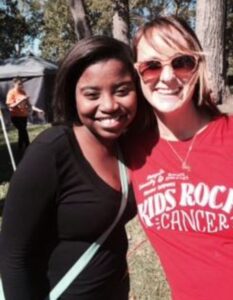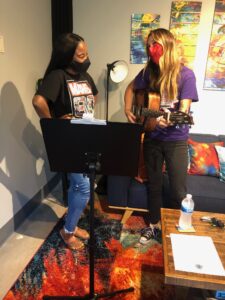Sick Cells interviews music therapist Tracie Sandheinrich about her experience working with adolescent sickle cell patients

Tracie (right), Brittany (left)
Many of us know what it feels like to emotionally connect with a song. Whether it’s the lyrics or an iconic guitar solo, although we may not be the original composer, the feeling of being moved by music is all too familiar. It’s because music has power that the professionals at Kids Rock Cancer of Maryville University are using to help children who live with cancer, and other oncology and hematology-related illnesses like sickle cell disease, navigate their day-to-day challenges.
In September, Sick Cells spoke with Tracie Sandheinrich, senior music therapist at Kids Rock Cancer, an innovative program that helps children successfully cope with the unique emotional challenges that accompany their diseases through the healing power of music therapy.
Tracie began working with Kids Rock Cancer at its inception in 2009 and is passionate about the positive impact music therapy has on children living with sickle cell. She, and the program’s team of music therapists, meet with patients on a quarterly to annual basis to compose songs that help them openly express their experiences in a safe, musical environment.
“When composing songs, we’re not shooting for Grammys,” said Tracie. “The songs don’t have to rhyme or be a specific genre. It can be fast or slow—it’s all based on what the participant feels is best. The process of letting the participant decide is so important.”
Building rapport with participants early on is key to a successful session. While topics vary across individuals, Tracie’s recognized pain and lack of awareness as common themes that come from those in the sickle cell community.
“I often see that sickle cell participants write and sing about their pain and how sickle cell is an invisible disease,” said Tracie. In fact, her team is in the process of conducting a research study on lyrical themes of songs which will dive deeper into these commonalities.
The Power of the Process
For the last decade, Tracie has worked closely with Brittany Butts, a sickle cell warrior, who fell in love with music therapy after being recommended to the Kids Rock Cancer program by her child life specialist.
When Brittany and Tracie meet for music therapy, the songwriting process always begins with a brainstorm that identifies what Brittany is currently experiencing. To uncover these experiences and dive deeper into Brittany’s feelings, they may discuss questions such as “how are you feeling today?” or “what challenges are you facing right now?” Revealing these thoughts helps Brittany, or any music therapy participant, identify the overall theme, tempo, genre and eventually the lyrics.

Tracie (right), Brittany (left)
When working with Tracie, Brittany also has the ability to choose whether she wants to compose a live song using an instrument, like piano or guitar, or explore Apple’s music creation studio application, GarageBand. While the final song is recorded and turned into an MP3 file, Tracie emphasized the importance of the overall music therapy session, not just the final product.
“It’s not about the product, it’s about the process,” said Tracie. “Some songs are survivor anthems or express significant pain and loss. In the end, they take what they’re expressing and cultivate it into a beautiful experience and come out of the session feeling good.”
Sick Cells heard firsthand some of the magic Brittany and Tracie created during one of their sessions. The song, “You Can Be the Reason,” has an uplifting theme and is just one of many finished products from Brittany. While Tracie considers Brittany a “veteran songwriter,” she expressed that those interested in music therapy need no prior musical experience.
Because the music therapist is in charge of providing the technical musical guidance and support, participants don’t have to have any musical training.
“Music therapy is universal—music touches all of us,” said Tracie. “You don’t have to be musical at all to find music therapy valuable.”
To learn more about Kids Rock Cancer, its work in the St. Louis community, and how it’s navigating its program amid the COVID-19 pandemic, please visit https://www.kidsrockcancer.org/